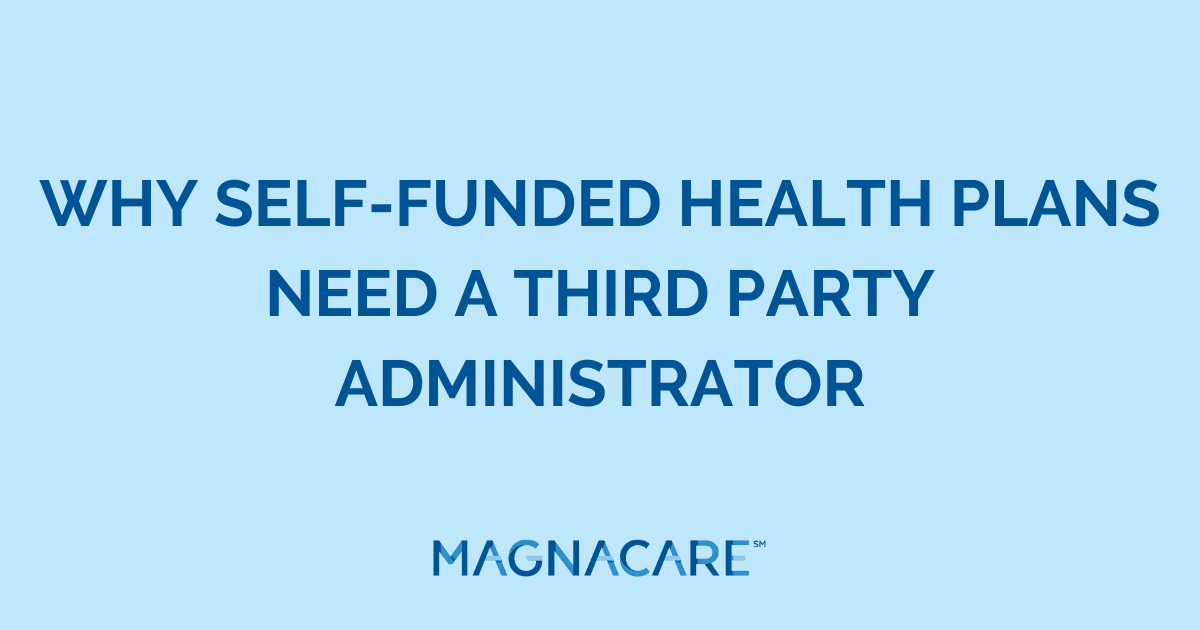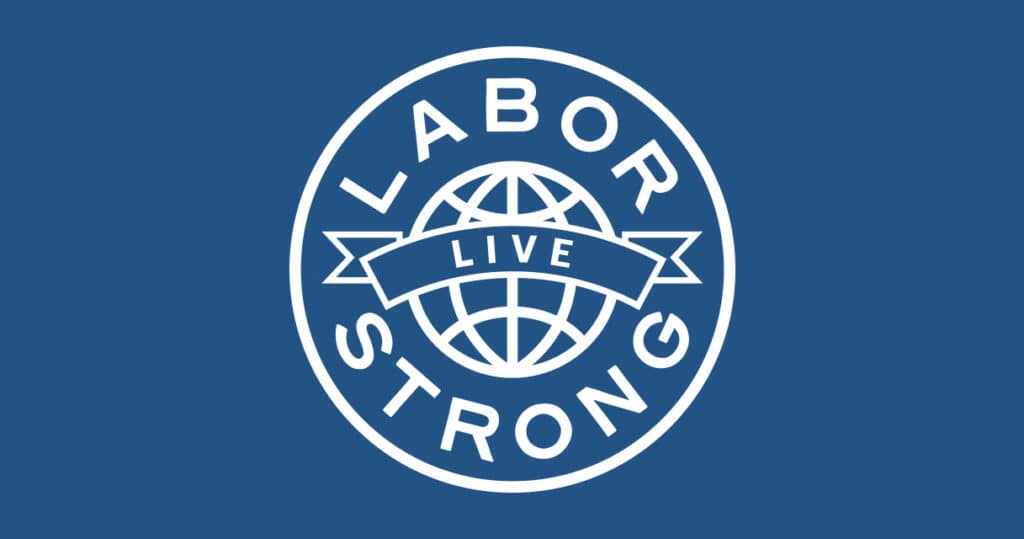Why Self-Funded Health Plans Need a Third Party Administrator

As an employer, you’re legally obligated to ensure your employees have access to affordable healthcare. You can offer them one of two options:
- A fully insured plan issued by an insurance carrier.
- A self-insured plan funded on your own.
Many businesses are recognizing the myriad benefits of self-insured plans. There’s only one problem: They’re running into complex administrative hurdles.
That’s where a third party administrator comes into play. Let’s examine the ins and outs of self-funding your health plan and explore why it pays to have a third party administrator on your side every step of the way.
Pros and cons of a self-funded plan
Before jumping into the pros and cons of self-funding your employee benefits, let’s take a step back and explain what we’re talking about.
According to the Self-Insurance Institute of America, a self-funded health plan — otherwise called a “self-insured” plan — is one in which the employer assumes the financial responsibility of providing healthcare benefits to its employee base. Basically, this approach means the employer acts as the plan sponsor and pays for health insurance coverage out of pocket.
In contrast, a fully insured employee benefit plan is one in which the employer contracts with an insurer, which takes full responsibility for paying members’ healthcare costs.
Many businesses choose to self-fund rather than work with an insurance company. In fact, 65% of covered workers are in a plan that’s at least partly self-funded. Why? Because self-funding has its benefits:
- Customization: Self-funded health insurance can be tailored according to your needs.
- Transparency: You can see exactly how your healthcare dollars are spent (most carriers don’t provide this visibility) and adapt and adjust accordingly.
- Control: You can leverage more say over employee benefits. As a plan sponsor, you can design the plan to include the insurance coverage you need or your employees prefer.
- Cash flow: Rather than paying fixed premiums every month, you pay for healthcare costs as they occur.
- Savings: You pay only for services your members actually use. Plus, you’re exempt from some of the taxes and fees associated with traditional health insurance.
That said, offering self-funded insurance coverage has its challenges. For example:
- Administrative burden: As plan sponsor, it’s your responsibility to do the administrative work, including claims administration, enrollment, renewal, negotiating with providers, and monitoring healthcare utilization.
- Financial risk: Self-funding means you’re fully bearing the cost of your employee benefit plan. The problem? Healthcare premiums are rising. In fact, the Kaiser Family Foundation reports that individual coverage premiums have increased $225 per year on average since 2010, whereas family premiums leap more than $700 annually.
Self-funded employers are therefore at a crossroads. How do you overcome the administrative burden, financial risk, and rising premiums associated with a self-insured plan?
The answer: Outsource the work to a third party administrator.
Understanding the role of a third party administrator
The International Risk Management Institute defines a third party administrator (TPA) as a company that “handles various types of administrative responsibilities, on a fee-for-services basis, for organizations involved in cash flow programs.”
More simply, administrators take on the burden of managing a self-funded health plan. TPAs are sometimes insurance carriers themselves, or they can be an independent organization entirely.
In either case, TPAs don’t provide health insurance. Instead, they help you administer insurance coverage to your employee base, working as the connective tissue between your company and the insurer. They do so by offering administrative services, such as:
- Setting up a network of healthcare providers.
- Designing the employee benefit plan.
- Handling claims administration, including adjusting and processing insurance claims.
- Keeping records and maintaining legal compliance.
- Creating and issuing health plan ID cards.
- Analyzing healthcare costs and optimizing expenses.
- Offering online services, such as a member self-help portal.
Okay — but how do administrators differ from an ASO?
An Administrative Services Only (ASO) company is typically a subsidiary of an insurance company, whereas TPAs may operate independent of a carrier. Both ASOs and TPAs offer administrative support, but ASOs have limited offerings. Third party administrators aren’t bound by what their parent insurer can provide, and therefore have more flexibility in designing your health plan.
Bottom line: TPAs allow you more freedom to tailor employee benefits to your liking and deliver the health insurance experience your members want and deserve.
Why outsource plan administration?
Managing your self-funded plan on your own is a time-consuming and distracting burden. Insourcing places all the responsibility on your internal resources, which — depending on the size of your company — may be limited.
On the flip side, you can outsource health plan management to a TPA, which has advantages for both you and your members.
Employer benefits
- Improved coverage: TPAs allow you to enhance health insurance coverage at a lower cost and offer a fully customized, high-quality provider network.
- Cost savings: Your administrator can negotiate lower rates with providers, thereby lowering your healthcare costs.
- Simplified compliance: TPAs are experts in health insurance compliance, so you can rest assured your company will always be meeting its regulatory requirements. Plus, if you need to generate a report in a hurry, you can do so with a few clicks — all your records are available online through an administrative portal.
- Member retention: Health insurance is one of the most important considerations employees have when choosing a company. TPAs allow you to leverage your employee benefits package as an important recruitment and retention tool.
Member benefits
- Online services: TPAs can offer members online tools to access health insurance data on the go and at a moment’s notice.
- Education: Administrators also can help members understand their insurance coverage through online resources and knowledge libraries.
- Increased flexibility: TPAs have a wider network of providers, giving members more choice in their healthcare experience.
- Improved experience: Working with a TPA also means gaining a dedicated customer support team that can answer member questions around the clock.
Simplify your health plan experience with MagnaCare
When deciding on a third party administrator for your self-funded health plan, ask yourself these three questions:
- Does this TPA offer the flexibility I need to make my members happy?
- Can this TPA provide high-quality healthcare experiences to my workforce?
- Does this TPA offer the technologies I need to simplify benefits administration and improve member experience?
These questions boil down to one common denominator: making your health plan simple, accessible, and rewarding for both you and your members. That’s exactly what MagnaCare is here to do.
As a trusted TPA with over 30 years of experience, countless employers have chosen MagnaCare to handle their self-funded administrative burden. With a nationwide network of leading providers and the flexibility to design a competitive employee benefit plan, you can rest assured your members are in good hands.
Better yet, we offer the one-of-a-kind Create® Technology platform, one source that manages all aspects of your health insurance experience. From eligibility and open enrollment to reporting, claims management, and more, it’s your one-stop-shop for benefits administration. With a self-service portal, members can search for providers, view their ID card, communicate with customer service, and much more — all within a single interface.
Ready to learn more? Check out our TPA services today.
MagnaCare Blogs

What to Expect from the Minimum Essential Coverage (MEC) Application Process
Finding a healthcare plan for your company isn’t…
Information on Change Healthcare Cybersecurity Incident
As widely reported in the media, Change Healthcare…

